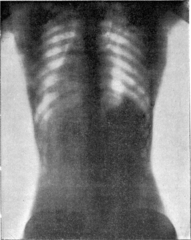
We are sick of the röntgen rays … you can see other people’s bones with the naked eye, and also see through eight inches of solid wood. On the revolting indecency of this there is no need to dwell.
— Pall Mall Gazette, March 1896

We are sick of the röntgen rays … you can see other people’s bones with the naked eye, and also see through eight inches of solid wood. On the revolting indecency of this there is no need to dwell.
— Pall Mall Gazette, March 1896
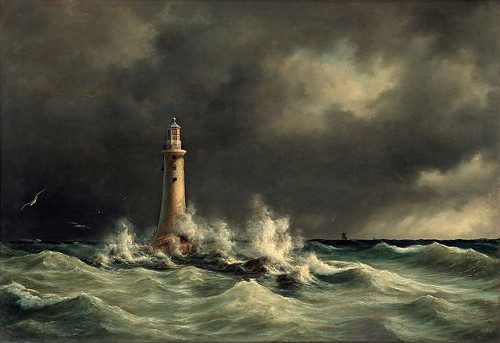
On a voyage to England in 1757, Ben Franklin narrowly escaped shipwreck.
Afterward, he wrote to his wife, “The bell ringing for church, we went thither immediately, and with hearts full of gratitude, returned sincere thanks to God for the mercies we had received.
“Were I a Roman Catholic, perhaps I should on this occasion vow to build a chapel to some saint, but as I am not, if I were to vow at all, it should be to build a light-house.”
Issei Sagawa took an unlikely path to fame — after killing and cannibalizing a Dutch woman in Paris in 1981, he wrote a fictionalized account of the crime, In the Mist, that sold 200,000 copies in his native Japan:
There is a loud sound and her body falls from the chair onto the floor. It is like she is watching me. I see her cheeks, her eyes, her nose and mouth, the blood pouring from her head. I try to talk to her, but she no longer answers. There is blood all over the floor. I try to wipe it up, but I realize I cannot stop the flow of blood from her head. It is very quiet here. There is only the silence of death.
Since his release from a Japanese psychiatric hospital in 1985, Sagawa has parlayed his reputation into a ghoulish industry. He has produced four novels, written a weekly column for a Japanese tabloid, appeared on the cover of a gourmet magazine, and is a regular subject of television documentaries. His crime inspired the Rolling Stones’ song “Too Much Blood.”
“The public has made me the godfather of cannibalism, and I am happy about that,” he said. “I will always look at the world through the eyes of a cannibal.”
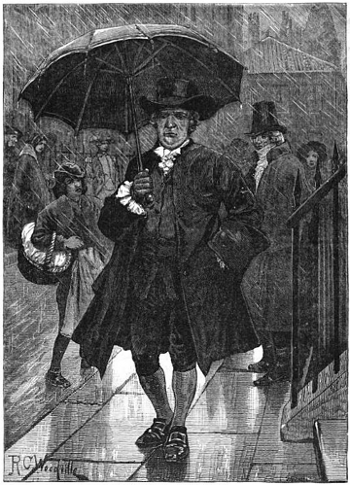
There is also another matter to be mentioned for which both present and future ages have good reason to bless the name of Jonas Hanway. He was the first person who had the courage to hold an umbrella over his head in walking along the streets of London. ‘The eighteenth century,’ writes Chambers, ‘was half elapsed before the umbrella had even begun to be used in England. General Wolfe, writing from Paris in 1752, remarks: “The people here use umbrellas in hot weather to defend them from the sun, and something of the same kind to save them from the snow and the rain. I wonder that a practice so useful is not introduced in England.” Just about that time, however, a gentleman did exercise the moral courage to use an umbrella in the streets of London. He was the noted Jonas Hanway, then newly returned form Persia, and in delicate health, by which, of course, his using such a convenience was justified both to himself and to the public. “A parapluie,” we are told, defended Mr. Hanway’s face and wig. For a time no other than dainty beings, then called “Macaronies,” ventured to carry an umbrella; and any one doing so was sure to be hailed by the mob as a “mincing Frenchman.” One John Macdonald, a footman, who has favored the public with his memoirs, found as late as 1770 that, on appearing with a fine silk umbrella which he had brought from Spain, he was saluted with the cry of “Frenchman, why don’t you get a coach?”‘
— “Jonas Hanway, the Philanthropist,” Frank Leslie’s Popular Monthly, April 1884
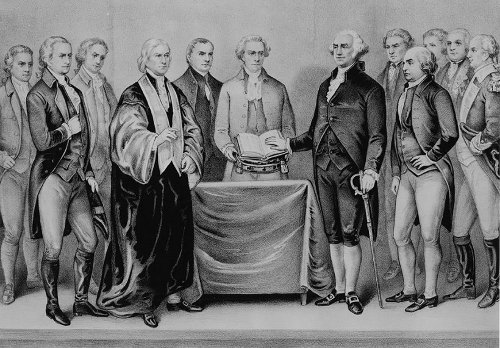
The U.S. Constitution requires that the president be at least 35 years old. But legal scholar Mark V. Tushnet imagines a loophole by which, say, a 16-year-old guru might be elected:
“Suppose that the guru’s supporters sincerely claim that their religion includes among its tenets a belief in reincarnation. Even on the narrowest definition of ‘age,’ they say, their guru is well over thirty-five years old even though the guru emerged from the latest womb sixteen years ago.
“Further, it would have been an establishment of religion for the President of the Senate to reject their definition of ‘age,’ and it would violate their rights under the free exercise clause … for the courts to overturn the decision made by the political branches.”
His point is that even the most seemingly straightforward provisions in the Constitution can require interpretation.
(“Interpretation Symposium: Constitutional Interpretation: Comment: A Note on the Revival of Textualism in Constitutional Theory,” Southern California Law Review, January 1985)
A canal stockholder’s argument against railways, from the Vincennes, Ind., Western Sun, July 24, 1830:
He saw what would be the effect of it; that it would set the whole world a-gadding. Twenty miles an hour, sir! Why, you will not be able to keep an apprentice-boy at his work: every Saturday evening he must take a trip to Ohio, to spend the Sabbath with his sweetheart. Grave plodding citizens will be flying about like comets. All local attachments must be at an end. It will encourage flightiness of intellect. Veracious people will turn into the most immeasurable liars; all their conceptions will be exaggerated by their magnificent notions of distance. ‘Only a hundred miles off! Tut, nonsense, I’ll step across, madam, and bring your fan!’ ‘Pray, sir, will you dine with me to-day at my little box at Alleghany?’ ‘Why, indeed, I don’t know — I shall be in town until twelve. Well, I shall be there; but you must let me off in time for the theatre.’ And then, sir, there will be barrels of pork, and cargoes of flour, and chaldrons of coals, and even lead and whiskey, and such like sober things, that have always been used to sober travelling, whisking away like a set of skyrockets. It will upset all the gravity of the nation. If two gentlemen have an affair of honour, they have only to steal off to the Rocky Mountains, and there no jurisdiction can touch them. And then, sir, think of flying for debt! A set of bailiffs, mounted on bomb-shells, would not overtake an absconded debtor — only give him a fair start. Upon the whole, sir, it is a pestilential, topsy-turvy, harum-scarum whirligig. Give me the old, solemn, straightforward, regular Dutch canal — three miles an hour for expresses, and two for jog-and-trot journeys — with a yoke of oxen for a heavy load! I go for beasts of burthen: it is more primitive and scriptural, and suits a moral and religious people better. None of your hop-skip-and-jump whimsies for me.
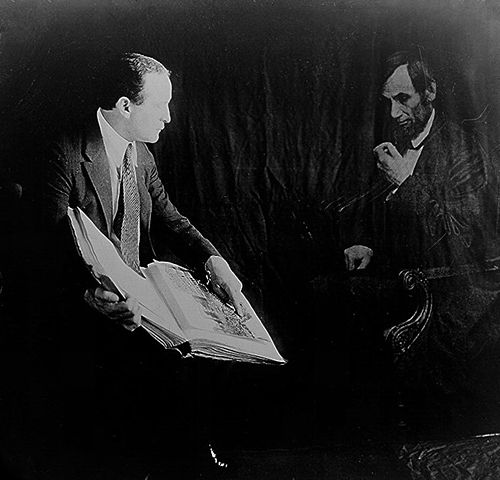
transpicuous
adj. transparent
In 1922, magician Harry Price published “Cold Light on Spiritualistic Phenomena” in the Journal of the Society for Psychical Research, showing that so-called “spirit photographs” could be created using simple double exposures. In support of the exposé, Harry Houdini had himself photographed with Abraham Lincoln.
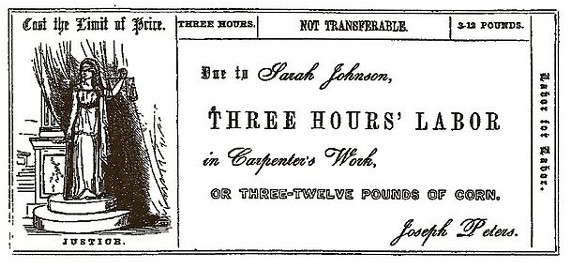
Anarchist Josiah Warren believed that the only just measure of a product’s value was the amount of labor that went into producing it. Charging more than this was “cannibalism” — interest, rent, and profit were state-sanctioned usury. Accordingly, he proposed a system where goods would be traded explicitly on this basis — “he who employs five or ten hours of his time, in the service of another, receives five or ten hours labour of the other in return.”
As an experiment, Warren opened a “time store” at the corner of Fifth and Elm Streets in Cincinnati in 1827. He priced all the goods at the amount he had paid for them, plus a small surcharge to cover overhead (his books were available for inspection at the back of the store), and customers could buy goods using “labor notes” — promises to perform labor, like the one above. As he accumulated notes, Warren would redeem those that he could use and endorse the rest, using them to buy more goods, following a list of their average cost in labor. In this way he set up a small economy among like-minded citizens in Cincinnati — each received fair compensation for his labors, but none could gouge another merely because “the market would bear it.”
In like spirit, Warren charged for his own time in running the store, using a clock — if it took him half an hour to help a customer buy groceries, 25 cents would be added to the customer’s bill. “This arrangement sweeps away at once all the higgling and chaffering about prices, so disgusting in the present system, but which is inseparably connected with it,” he explained in his 1852 book Equitable Commerce.
The store operated successfully for three years, with such low prices that the competitor on the next corner asked Warren’s help in coverting his own store to Warren’s system. Warren closed the time store voluntarily in May 1830 — because, according to one account, he felt he had no claim to the increase in value of the land on which it stood.
Letter from Charles Dickens to a chimney sweep, March 15, 1864:
Dear Sir,
Since you last swept my study chimney it has developed some peculiar eccentricities. Smoke has indeed proceeded from the cowl that surmounts it, but it has seemingly been undergoing internal agonies of a most distressing nature, and pours forth disastrous volumes of swarthy vapour into the apartment wherein I habitually labour. Although a comforting relief probably to the chimney, this is not altogether convenient to me. If you can send a confidential sub-sweep, with whom the chimney can engage in social intercourse, it might be induced to disclose the cause of the departure from its normal functions.
Faithfully yours,
Charles Dickens
During the Civil War, the U.S. Treasury received a check for $1,500 from a private citizen who said he had misappropriated government funds while serving as a quartermaster in the Army. He said he felt guilty.
“Suppose we call this a contribution to the conscience fund and get it announced in the newspapers,” suggested Treasury Secretary Francis Spinner. “Perhaps we will get some more.”
Ever since then, the Treasury has maintained a “conscience fund” to which guilt-ridden citizens can contribute. In its first 20 years, the fund received $250,000; by 1987 it had taken in more than $5.7 million. One Massachusetts man contributed 9 cents for using a damaged stamp on a letter, but in 1950 a single individual sent $139,000.
In order to encourage citizens to contribute, Treasury officials don’t try to identify or punish the donors. Most donations are anonymous, and many letters are from clergy, following up confessions taken at deathbeds.
Many contributions are sent by citizens who have resolved to start anew in life by righting past wrongs, but some are more grudging. In 2004, one donor wrote, “Dear Internal Revenue Service, I have not been able to sleep at night because I cheated on last year’s income tax. Enclosed find a cashier’s check for $1,000. If I still can’t sleep, I’ll send you the balance.”